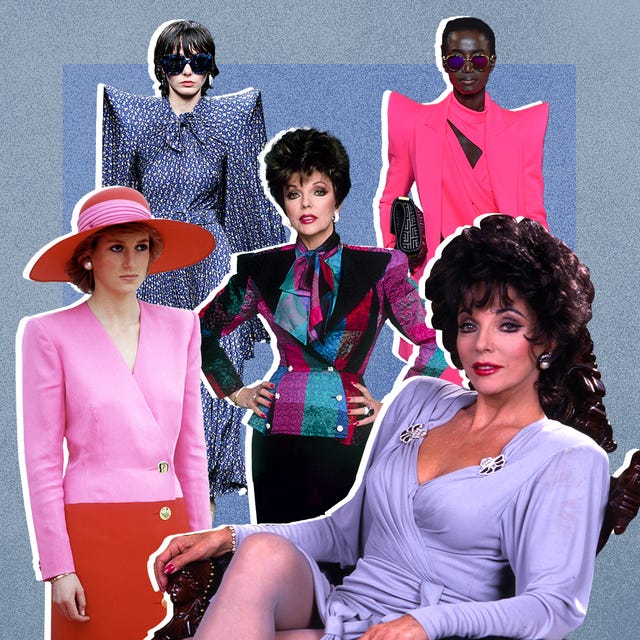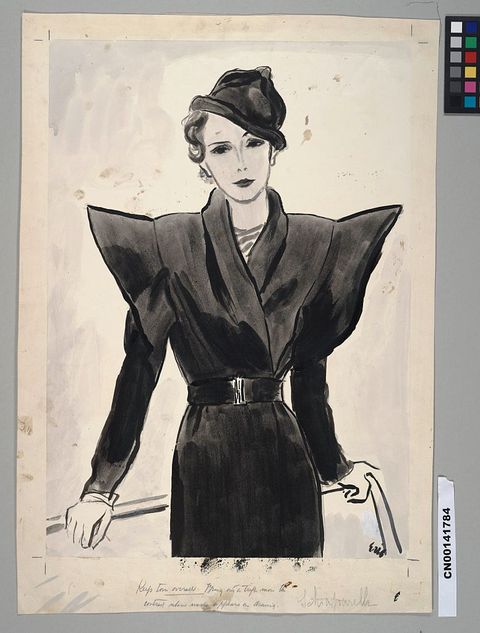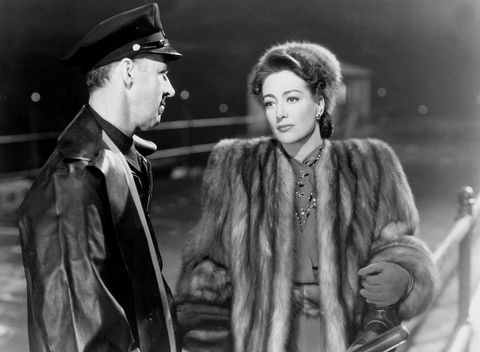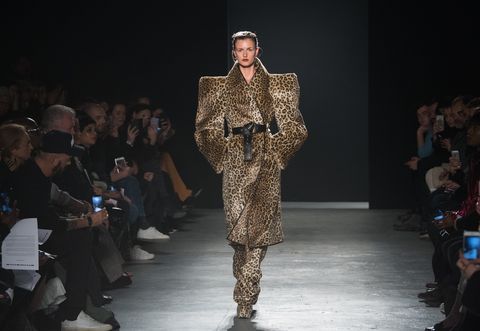Why Dynasty-Style Shoulders Are Making a Comeback
"In times of insecurity and instability, shoulder pads are like armor," and we need them now more than ever.
Whenever there is a notable resurgence of shoulder pads in fashion—as we have seen in several instances this year, from the Balenciaga and Saint Laurent shows back in March to the latest Givenchy and Balmain collections from Paris Fashion Week two months ago—tribute must be paid to the enduring legacy of Dynasty.
The '80s soap opera, in the hands of its legendary costume designer, the late Nolan Miller, epitomized everything that era stood for: decadence and wealth, glamour and power. It also gave us the style icon Alexis Carrington (the role that turned Joan Collins into an international, Golden Globe-winning star). As Dynasty's resident villain, she gave rise to a new breed of woman—powerful, power-hungry, and armed with a fabulous wardrobe to dress the part. (Miller never repeated a look on the 9-season-long show and enjoyed a cushy $35,000 budget per episode, which in today's currency translates to around $90,000.) Alexis dominated men's worlds and commanded over hostile territory in the one percenter's version of armor: mink, diamonds, and lots of shoulder pads.
While any use of shoulder pads immediately conjures up the '80s, they really have their roots in the 1930s, courtesy of fashion's pioneering surrealist, Elsa Schiaparelli. Her inspiration for that upside down triangle shape? American football players. At that time the emphasis on broad shoulders was simply to make women's waists appear smaller.
"It wasn't a power thing but a way of making a woman's body look more feminine, in a way," says Valerie Steele, director and chief curator of the Museum at the Fashion Institute of Technology in New York. "It was an alternative to the hourglass look."
Then the style really took off during World War II, when women began entering the workplace and so came the need to fit in, sartorially, to male-dominated surroundings. "Shoulder pads are nothing if not versatile," says Simon Doonan, former creative ambassador for Barneys and the author of the new How to Be Yourself: Life-Changing Advice From a Reckless Contrarian. "They can be used to intimidate adversaries. They can also be used to attract attention. In the 1980s, women charged into the workplace in vast numbers and those Dynasty shoulder pads indicated they meant business. The same thing happened during the war when women took on increasingly emancipated roles. Et voila! The Joan Crawford look!"
So what are we to make of the style's resurrection now? To be clear, the return of shoulder pads isn't new to 2020—Demna Gvasalia has been playing with shoulders for the past few seasons at Balenciaga and Gareth Pugh took Dynasty-esque shoulders to the next level in his fall 2018 collection, which he said was created for "women who accept zero bullshit."
Indeed there is a lot of bullshit women have had to deal with these past few years, starting perhaps with the election of Donald Trump in 2016, which was greeted by the Women's March in Washington D.C. that later ushered in the #MeToo movement a year later. The pandemic put in sharp relief all sorts of other work-life compromises and difficulties. Plus, on top of it all, 2020 was an election year.
"In times of insecurity and instability, shoulder pads are like armor," says Rafael Gomes, director of fashion exhibitions for the Savannah College of Art and Design. "It's not about dressing like a man," adds Meredith Markworth Pollack, the costume designer of the CW's remake of Dynasty. "It's for women to feel their own strength and their own power."
“Historically, we’ve seen examples where people under threat, their appetites might grow stronger, and their expressions might grow more extreme, because there is nothing to lose,” Owens told WWD. “In the face of adversity, you need to do your very, very best. That’s when all your powers need to come to the forefront and you need to fight the strongest…So the clothes, when I look at them, they’re kind of full-on.”









No comments:
Post a Comment
Note: Only a member of this blog may post a comment.